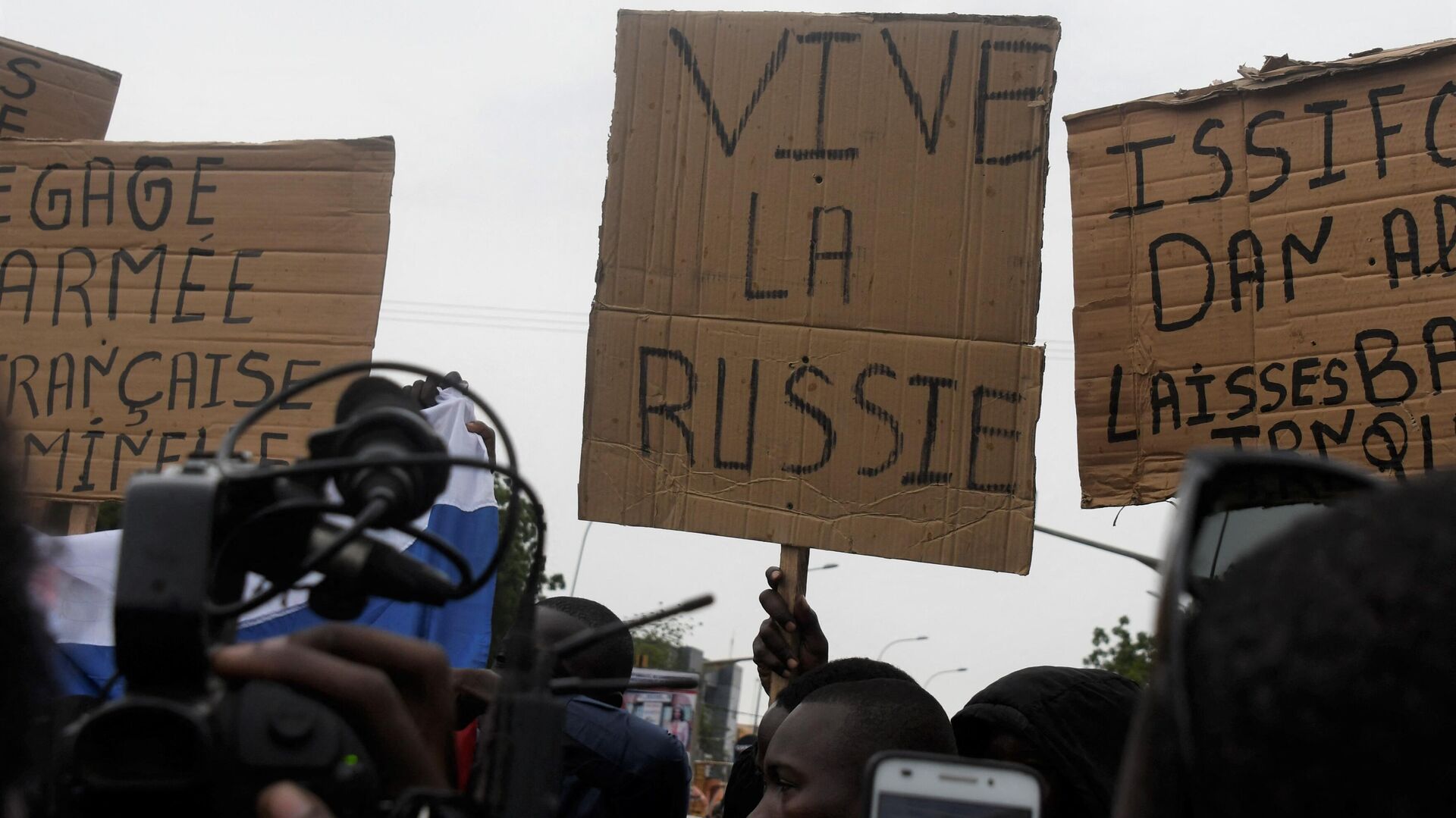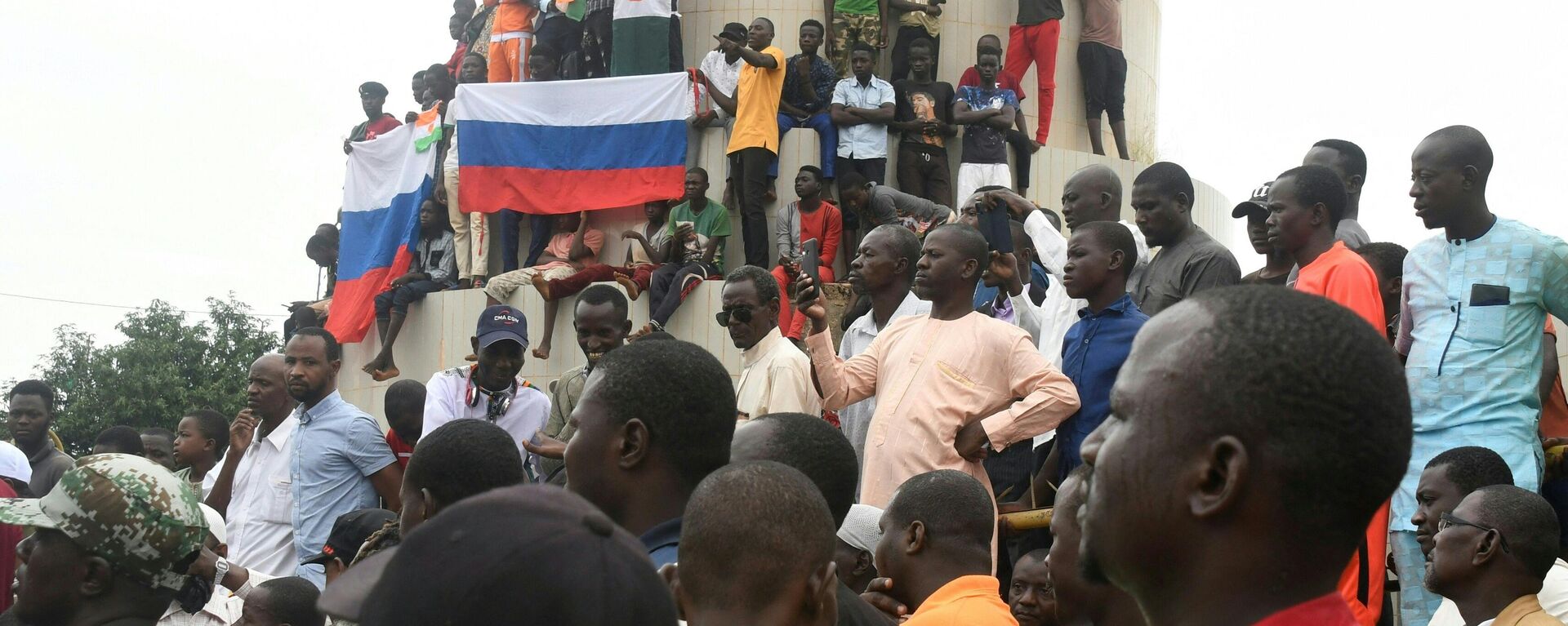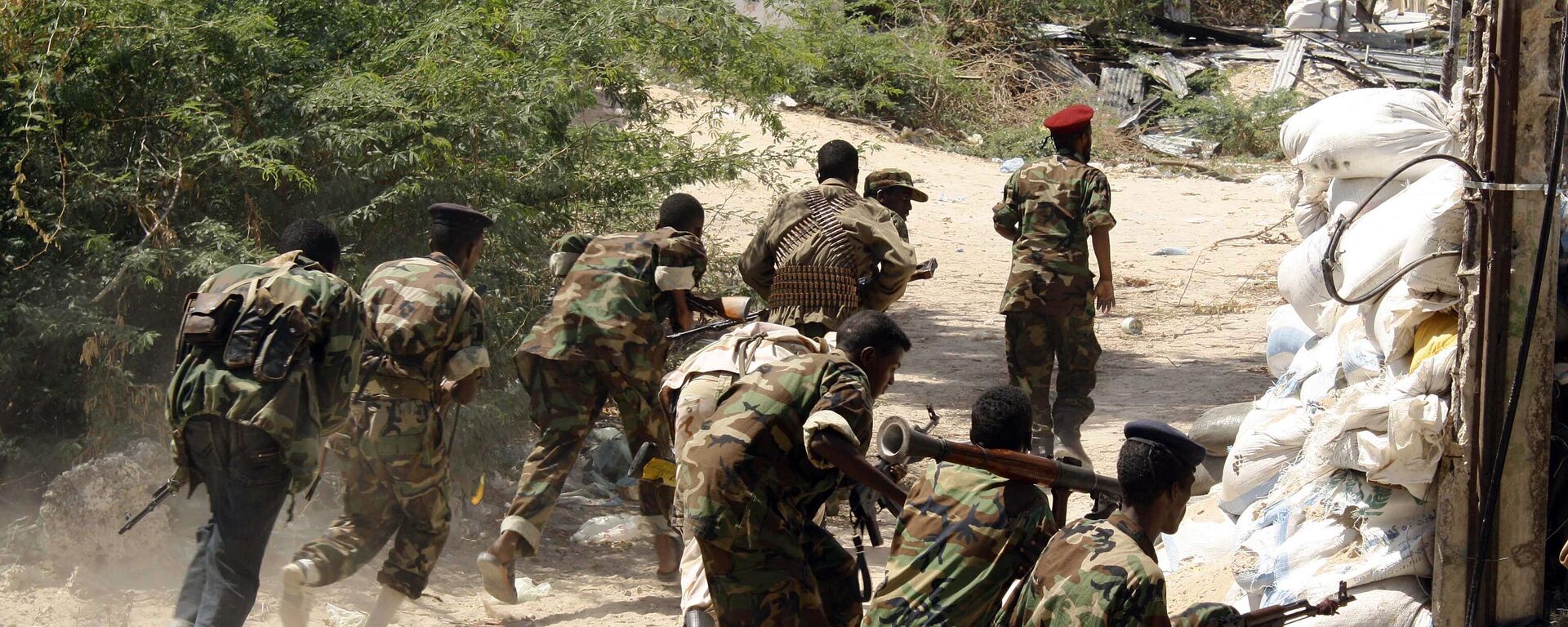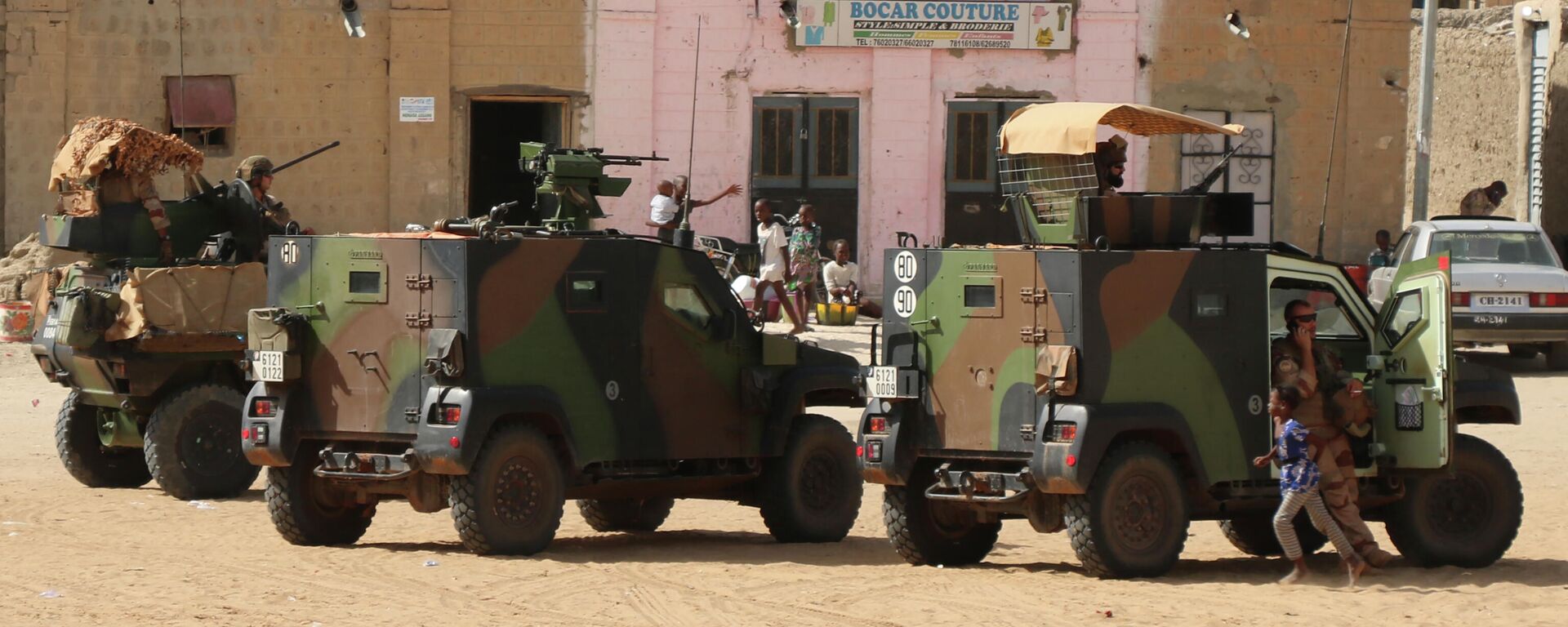Why Nigerien Protesters Want French Army Out & Wave Russian Flags
17:05 GMT 20.09.2022 (Updated: 09:05 GMT 10.02.2023)

© AFP 2023 / BOUREIMA HAMA
Subscribe
Nigeriens took to the streets of the country's capital Niamey on September 18, with some of the protesters carrying Russian flags and placards saying "criminal French Army - get out" and "The colonial army of Barkhane must go".
"The demonstration [on September 18] fits in a wider development and sentiment that has been brewing in recent years," explained Dr. Klaas van Walraven, a historian and political scientist at the University of Leiden who is currently working on the history of colonialism and de-colonization in French Equatorial Africa.
"Last year, the population of Téra, in the south-west, tried to prevent a French military convoy entering the country from Burkina Faso to move further into Niger, out of anger over the insecurity in the south-west. There is much anger about the rising insecurity especially in the western region of Niger, bordering on both Mali and Burkina Faso. The trigger here was the mess in Mali but similar problems that seem part of the problem exist in Niger (such as the problematic relations between sedentary and pastoral communities)," the historian continued.
On November 27, 2021, at least two people were killed and 18 injured in western Niger when protesters clashed with a French military convoy. They blocked the convoy after it crossed the border from Burkina Faso, protesting over French forces’ failure to stop rising violence by Islamist militants affiliated with al-Qaeda and Daesh. The Guardian noted at the time that "anger about France’s military presence in its former colonies has been rising in Niger, Burkina Faso and other countries in west Africa’s Sahel region."
The latest protests in Niger were organized by the M62 movement, a group of NGOs which reportedly describes itself as "peaceful" and committed to "the dignity and sovereignty of the Nigerien people." Seydou Abdoulaye, the coordinator of the M62 Movement, told Agence France Presse (AFP) that Nigeriens demand the immediate departure of French troops from Niger as the military deployment violates Niger's sovereignty and destabilizes the Sahel.
France has beefed up its presence in Sahel since January 2013 when it launched Operation Serval to halt the advance of a coalition of Tuareg rebel and Islamist fighters in Mali. The French intervention came on the heels of the 2011 destruction of Libya by NATO. Following the ousting of Muammar Gaddafi’s government by NATO-backed rebels, the power vacuum saw greater destabilization in the region. The French-led Operation Barkhane succeeded Operation Serval in August 2014: approximately 4,500 French troops were deployed between Mali, Burkina Faso, Niger, and Chad.
Sahel's Dissatisfaction With France's Operation Barkhane
Operation Barkhane has failed to curb the terror threat in Sahel, according to Dr. Mady Ibrahim Kante, lecturer at the Faculty of Administrative and Political Sciences of the University of Legal and Political Sciences of Bamako.
"I think this is the situation which all the population of the Sahel can see," said Kante. "This situation pushes the population to say ‘no’ to French troops in Niger because the same troops were in Mali before. All this time, they didn't reach any solution for the situation in Mali (…) We can see the situation in Mali is catastrophic, because when they [French] first came to Mali in 2013, it was the terrorism in the north [of the country] only, but after eight or nine years the terrorism is not just only in the north of Mali, but in the central and other regions of Mali (…) If they [French] come to Niger, it will be the same."
France decided to withdraw its troops from Mali in June 2021 and completed the pull-out in August 2022. Paris’ relations with Bamako have deteriorated since 2020, with Malian Prime Minister Choguel Kokalla Maiga accusing the French in February 2022 of having sought the partition of the west African country during its military mission and assuming that the French intervention helped terrorists in the north to regroup. Having pulled out from Mali, Paris brought its troops to Niger, making the latter its new military hub with close to a thousand soldiers based in Niamey.
"[Nigerian] people are afraid that France is not able to solve the terror problem and, to some extent, some of them think or are afraid that the presence of French troops in that region is another new sort of occupation, 'new colonialism'," noted Dr. Ismael Buchanan, senior lecturer at the Department of Political Science and International Relations at the University of Rwanda. "That is the reason why many local people are complaining that French troops must or should get out of their territory in case it cannot protect them."
However, France is seeking to maintain its presence in Niger because the land-locked sub-Saharan nation possesses the world’s fourth-largest uranium reserves, remarked Kante. Uranium, which was discovered in Niger by the French Bureau de Recherches Geologiques et Minières (BRGM) in 1957, is mined close to the towns of Arlit and Akokan, 900 kilometers northeast of Niamey.
"[If we talk about France's interest in the country], Niger can be the first country by uranium and other natural resources [which are] in Niger," he said. "France will do everything to keep Niger as an ally in the Sahel. That is important for France to be there. Even in Mali – when France decided to come to Mali – it is a tool to try to keep or to save their interests in Sahel in general, and especially in Niger."
Russian Flags in Niger
As anti-French sentiment grows in the Sahel region, France has been strengthening relations with the Niger leadership, according to France 24. The French broadcaster drew attention to the fact that Niger’s President Mohamed Bazoum was the only leader among Sahel rulers who shared a room with his French counterpart Emmanuel Macron during a virtual G5 Sahel meeting in July, 2021. The pivot to Niger was highlighted by Macron again in February 2022, according to the broadcaster. France 24 called the strategy a "marriage of convenience," adding that Paris has "little choice."
However, despite boosting relations with Niamey, France has failed to win the hearts and minds of ordinary Nigeriens, according to Kante.
"I think the authorities of Niger decided to bring French troops to Niger from Mali without the agreement of all of the opinions of the population," he explained. "Part of the population in Niger and even in Burkina Faso didn't agree and [will] never agree [to the presence of] different troops, French or even European, in Niger or in the Sahel in general. I think this is the same process, procedural process that they did before, they will continue to protest against Barkhane in Niger."
The fact that Nigeriens carried Russian flags during the protests could be explained by the people's belief that "Russia’s presence in the region may rescue them and Russia as a strong nation is maybe able to secure the region by fighting the insurgency," according to Dr. Ismael Buchanan.
On the other hand, the pro-Russian sentiment in Niger could be driven by Mali's decision to invite Russian military advisers from the PMC Wagner Group to cope with the rebel and jihadism threat following France's unilateral decision to pull out from the country.
Last spring's survey, conducted by Friedrich-Ebert-Stiftung, a German political foundation, indicated that 93.5% of Malians were aware of Russian military instructors' presence in the country with nine out of ten respondents (92%) believing that Russians will help Mali regain its territorial integrity. 73% of Malians expressed dissatisfaction with France's Barkhane Operation, accusing French troops of failing to protect locals against violence and terrorism.
Likewise, Russian military instructors have made progress in the Central African Republic (CAR), given that the region has been engulfed in conflicts for over twenty years. CAR President Faustin-Archange Touadéra turned to Russians in 2017 as he was disappointed by the inability of UN peacekeepers to curb violence in the country. Russia's growing influence in Africa has prompted a lot of criticism from the West, especially after a plethora of African states refused to vote in favor of a UN resolution aimed against Russia's special operation to demilitarize and de-Nazify Ukraine.
*Al-Qaeda, Daesh (ISIS/ISIL/Islamic State) are terrorist organizations banned in Russia and many other countries.




